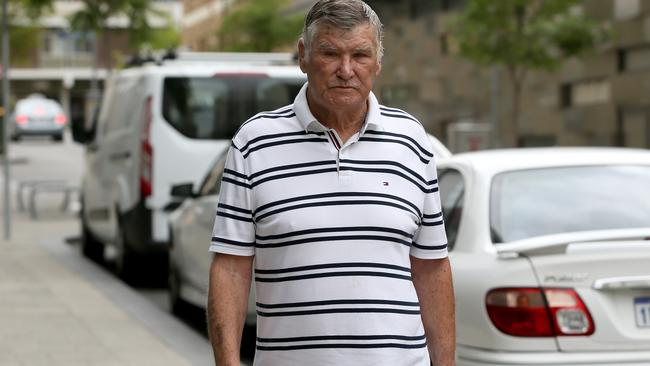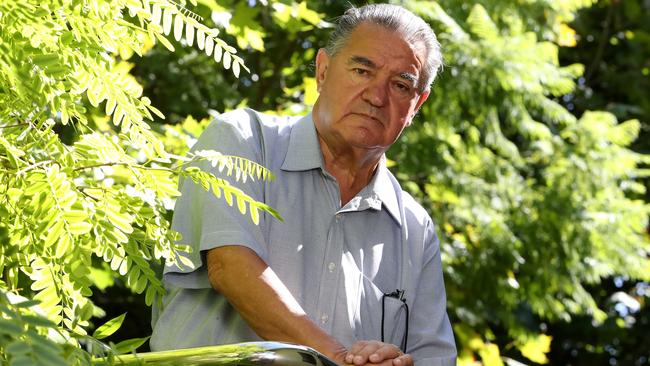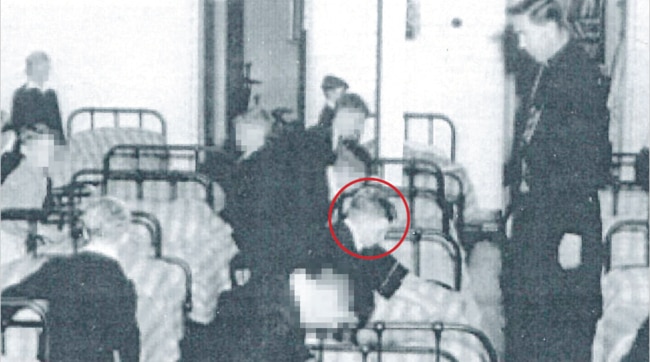Child sex abuse: salt in the wound
A victim of historic sex abuse by Christian Brothers is in a landmark case for compensation.

Among the lawyers working on the multitude of compensation cases stemming from child sexual abuse inside Australian orphanages and churches, it has become known as the “salt-in-the-wounds defence”.
As those lawyers engage in negotiations with institutions such as the Christian Brothers, they often run into the same legal argument: that the physical and emotional abuse and educational neglect the same children suffered in their care, coupled with the already poor prospects of the children before they were abused, should be reflected in lower compensation than they would otherwise be entitled to.
Up until now, it’s an argument that has been made only behind closed doors.
But a landmark legal case that played out in Western Australia’s District Court during the past three weeks has brought the argument out into the open.
John Lawrence — one of the thousands of child migrants sent from Britain to Australia in the 1950s, and who endured years of depraved sexual abuse by the men who were supposed to look after him — is suing the Christian Brothers for compensation over the assaults that seemingly ruined any hopes for a functional adulthood.
His horrific story of suffering was one of thousands of such cases in Australia.
Remarkably, however, his case is believed to be the first such compensation case against the Christian Brothers or the Catholic Church to make its way into an Australian court.
The upcoming judgment from Justice Mark Herron will set a precedent that will be scrutinised closely by abuse survivors, lawyers, the Christian Brothers and the numerous other institutions that have faced allegations of historical sex abuse.

‘Poor prospects’
For decades the Christian Brothers and other institutions effectively were protected from compensation claims by statutes of limitation. But Victoria lifted those restrictions in 2015 and Western Australia followed suit in 2018.
Crucially, however, Western Australia’s change was restricted specifically to sexual abuse claims only.
That has opened the door for lawyers from the Christian Brothers and other institutions to argue the “salt-in-the-wounds defence”.
The Christian Brothers formally admitted on the eve of the trial to the sexual abuse committed against Lawrence, and have apologised for his trauma, but have argued that other factors in his childhood — including other forms of abuse inflicted by the Christian Brothers — contributed to his psychological problems.
Bettina Mangan, representing the Christian Brothers, opened her case by noting that the judge would need to determine the extent to which Lawrence’s psychological trauma was driven by other factors, including “the physically violent and emotionally and physically deprived environment for children” at the Christian Brothers orphanages.
Mangan also pointed to the emotional trauma suffered by Lawrence when he was separated from his family, years before he was sent to Australia, as well as his subsequent alcohol and substance abuse, the dysfunctional relationship with his wife, and the serious medical conditions that have plagued his adult life.
On top of that, she said, it “cannot be overlooked and it is sad to say that these migrant children, many of them had very poor prospects indeed simply because of the lack of care of the entirety of society”.
It was an argument that Herron described in court as “brutal”.
“It seems to be the defendant’s position … that besides subjecting Mr Lawrence to sexual abuse, we’ve also subjected him to other sorts of abuse, we’ve physically abused him, we’ve neglected his care and welfare, we haven’t satisfactorily discharged our statutory duty to properly care for him, to educate him, to teach him, to provide him with a proper upbringing,” the judge said.
“We’ve been wanting in all of that, but that’s not compensable, so we point to all of those other failures on our part, which we say have contributed to his current circumstances, and we’re guilty of all of those other matters as well, but he’s not entitled to be compensated for those and they reduce the damages to which he is entitled because of the psychiatric injury that he’s experienced because of the sexual abuses.
“Is that what the defendant says?”
Mangan said that while the argument sounded “illogical and unfair”, it reflected the law as it stands.
“Because of the unusual nature of this legislation, the court cannot escape from the fact which is this child did not come from a well-off middle-class family with professional parents and great prospects,” she said.
It’s an argument that has sparked outrage from other abuse survivors and their lawyers.

Childhood of horror
Across two days in the witness box, Lawrence recalled his childhood in haunting and at times stomach-churning detail.
In 1963, as an eight-year-old, he boarded a ship called the New Australian and set sail for Fremantle. He had been told that, in Australia, he and the other children would ride donkeys to school and pick lollies from the trees.
The reality awaiting Lawrence could hardly have been more horrific.
From the age of nine, he was being anally raped by Brother Lawrence Murphy.
It was then that Lawrence began to contemplate suicide for the first time. He would later make “dozens and dozens” of suicide attempts over the rest of his life. Even today, he says, he keeps a box of powerful painkillers nearby. “If I take them, that’s it,” he told the court. “I’ve got them on me all the time; if I want to take my life, I will take it.”
(Murphy was arrested and charged over the sexual abuse in 1997, but ill-health prevented him from going to trial before he died. All the other perpetrators have also died.)
The abuse of Lawrence continued even after Murphy left Western Australia for Adelaide. The boy, with his small frame and blond hair, was preyed on by at least two other brothers — Francis Marques and Alonzo Angus — as well as a lay teacher at the home, Joe Jackson.
Nowhere was safe — the abuse occurred in the orphanage’s gymnasium, work shed, milk yard, chicken coop, pig pen and the movie theatre packed with children.
In one instance, Marques took Lawrence to the home’s saddle room, hoisted Lawrence over a saddle and attempted to anally rape him.
By that time Lawrence was used to wearing multiple pairs of underpants to hide the bleeding that would follow his rapes.
Lawrence, who had struggled to learn anything while being taught by Murphy, was hopeful that Jackson was going to help him with his learning when the teacher summoned him to his small room at the school.
Instead, Jackson twice made the young Lawrence put on a skirt, blouse and lipstick and then performed oral sex on the boy.
Lawrence was basically illiterate and innumerate by the time he finally left Clontarf as a 16-year-old, and began an itinerant life in which he was never able to escape the demons of his childhood.
He held an estimated 150 jobs between leaving the orphanage at 16 and moving on to a disability pension at 45.
He met his wife, Brenda, when they were both in-patients at the Graylands mental health hospital. She taught him how to read and write after they were married, and he describes her as a good woman, but their volatile relationship has been marred repeatedly by heated alcohol-fuelled rows and break-downs. He wanted children but is grateful they never had any.
“I would not trust myself with what I’ve been through,” he told the court.
“I might molest them.”
Closely watched case
Lawrence is being represented in the court by Tim Hammond, the former federal Labor MP who has returned to law after quitting parliament. Hammond is pushing not only for the estimated lost earnings across Lawrence’s lifetime but also aggravated and exemplary damages on the grounds that the Christian Brothers knew that the Brothers who abused Lawrence had histories of abusing other children.
The courtroom’s gallery has been well occupied by numerous lawyers watching to see how the case unfolds.
Then there are those such as Judy Courtin, who is representing abuse victims across Australia and who has been following the trial closely from Victoria.
She tells Inquirer she is angry, although not surprised, to see the Christian Brothers fighting so hard against Lawrence.
“How dare they try to crush this man. It’s disgusting,” she says. “After the royal commission, all the pledges, all the promises they’d changed, it’s the biggest load of codswallop I’ve heard.”
The physical violence doled out by the Christian Brothers, she says, was often a tool that would pave the way to sexual abuse, given the chronic fear it instilled in already vulnerable children. The idea of that same violence being used to secure a “discount” for the compensation turns her stomach.
If it succeeds in court, she says, it will be an example of the law not functioning properly.
“It would be a profound injustice,” she says.
The case also has drawn a strong response from other survivors of abuse.
Tony Costa, who was raised at the Christian Brothers orphanage at Bindoon in Western Australia and who went on to become the mayor of Subiaco, describes the legal arguments as a fresh form of abuse.
The comments from the Christian Brothers’ legal team about the poor prospects of the child migrants and the trauma that stemmed from the separation from their parents is particularly riling, he says, given the horrors boys such as Lawrence were forced to endure.
“They were the perpetrators, they did this untold damage, and to see them make that assessment was appalling,” he says.
In his time at Bindoon, he says, he saw how physical abuse could lead to sexual abuse.
“It was this barbaric institutional lifestyle run by perverse, cruel men,” he says.
“I saw kids being flogged on the one hand and then being molested by these bastards.
“We lived in bloody fear for our lives, from the beltings and physical abuse.”
Mother blamed
A key argument advanced by the Christian Brothers’ legal team is that Lawrence’s abandonment by his mother, which predated the orphanage abuse, contributed significantly to his subsequent mental problems. Lawrence still feels resentment towards his mother, who he said treated him differently to her other children and once dropped him on his head on a concrete floor.
But Daniel Shub, a psychiatrist with expertise in child and adolescent psychiatry who was called by Lawrence’s legal team as an expert witness, told the court that the chances young Lawrence had of ever dealing with his perceived maternal abandonment were trashed by the abuse he subsequently suffered in Australia.
“I’ve treated thousands of children, adolescents who have come from disadvantaged, problematic backgrounds, who have had a very positive developmental trajectory irrespective of whether they were raised in a middle-class suburb by professional parents,” he said. “The difference here is that these people were not subject to chronic repeated sexual abuse.”
Hundreds of other victims will be watching Herron’s decision closely, given the precedent it sets for their own compensation claims.
But regardless of the final outcome, Costa says Lawrence deserves praise for pursuing the case and ensuring his brutal story is told.



